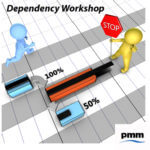Workshops should be an integral part of your project management office (PMO) processes. They can hold the key to moving projects along and removing bottlenecks; there are many benefits to your PMO of running workshops.
Workshops can be run offline or in a virtual environment and are meant to bring about creative thinking and a resolution to issues. Whether you’re considering bringing in workshops to your PMO set-up or are looking for reasons to expand your use of workshops, it’s important to understand the direct and indirect benefits they offer.
1. Workshops resolve a query
Running a workshop can get to the crux of an issue that is stopping a project from progressing. If there is something that a project team can’t agree on or needs to be resolved faster than normal processes allow, a workshop can bring resolution.
Plan a workshop well, and you can make sure that a major question is answered and a way forward is agreed.
2. A problem can be fixed quickly
Everyone who works on projects knows that problems can arise that can feel insurmountable. A workshop can change the way people work on an issue and encourage fresh thinking that will give new answers.
Having focused sessions that are designed to get to the bottom of a problem will improve outcomes.
3. Workshops get the job done
A session – which can last from a couple of hours or as long as a whole day – has a goal in its sights and is there to get the job done. You can ensure there are no distractions from other projects, stakeholders, or peripheral issues so that everyone works with one aim.
You can also be sure that the right people are on hand, the right experts are in the room, and the people who can drive actions after the workshop know what they need to do next.
4. Build a culture of collaboration
Workshops offer a different way of working. People are brought together and guided through a process that will give an answer or resolution.
Particularly now that remote and hybrid working is becoming more common, post-pandemic, people can feel like they work in siloes and don’t interact with their team as much. Using workshops when needed can help people work on their collaboration skills and build networks that have been lost or never had the chance to form.
5. Workshops encourage team solutions
When people collaborate, the answers workshops generate should get more buy-in from the attendees. Rather than a team feeling like decisions have been imposed on them by people who may not be experts, they will feel in control and valued.
Consider using workshops to plan the project schedule or to lay out the upcoming tasks. This will ensure that subject matter experts pitch in with how long tasks should take, and this can be balanced with project expectations.
6. Bringing skills and people together
Sometimes, workshops need input from across projects or even from outside your business area. You can bring together people who don’t normally work together to get the best answers for your workshop.
It can even be the case that people who work together on a project will rarely spend time talking to each other. A workshop puts teammates together to work through issues and helps them build networks – which can also improve problem-solving in the future.
7. Workshops encourage innovation
When new people are working together and are put in a novel environment, they have the chance to think differently. For example, if you put a web developer in a room with a copywriter, they may be able to find an innovative answer to a problem their project is facing.
The same can be true for bringing together people from different projects, business areas, or even knowledge levels. Put in a space where open discussion and free thinking are encouraged, and you will see fresh thinking and new approaches to problems and questions.
Why should my PMO use workshops?
The benefits of workshops for your PMO are multitude. They aren’t a silver bullet for every situation, but when used correctly, a workshop can make the team feel valued and drive a project forward.






